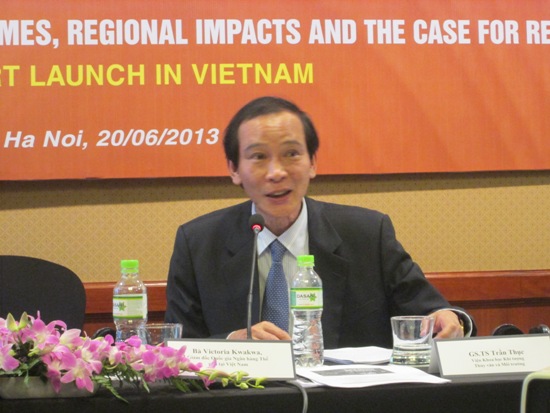Vietnam should consider climate change mitigation an opportunity to swiftly embrace a low-carbon economy and protect the environment, one expert has said.

Dr. and Prof. Tran Thuc, Director of the Vietnam Institute of Meteorology, Hydrology and Environment at the WB's report launch ceremony on June 19 in Hanoi
Dr. and Prof. Tran Thuc, Director of the Vietnam Institute of Meteorology, Hydrology and Environment, made the statement at the launch ceremony of the World Bank (WB)’s report, “Turn Down the Heat: Climate Extremes, Regional Impacts and the Case for Resilience” in Hanoi on May 20. WB’s Chairman Jim Yong Kim launched the report in London on June 19.
According to Thuc, climate change is the result of human activities and could be mitigated by reducing greenhouse emission, improved energy efficiency and changes in people’s behaviour.
“Even though Vietnam contributes only 0.4% to greenhouse emissions in the world, the country needs to take action to curb the situation for the sake of the world as a whole,” Thuc emphasised.
He said that the government of Vietnam considers adaptation to climate change a core task. It also regards the reduction of greenhouse emissions as an opportunity to adopt a green economy, renovate technologies and enhance the economy’s competitiveness.
“The report forecasts that the world may warm by from 2-4 degrees Celsius in the next two or three decades and people would feel worried but it may happen,” he said.
Vietnam’s Mekong Delta region is among three deltas in the world hardest hit by sea level rise. Under the scenario by the Ministry of Natural Resources and Environment, in case of one-metre sea level rise, 40% of the region’s population would be affected and around 12% of the country’s population would be directly affected.
“We should not be too worried as apart from negative effects, climate change brings certain opportunities to businesses, including urban water drainage industry. It’s necessary to encourage the involvement of enterprises in both climate change adaptation and mitigation,” he noted.
The country should give first priority to urgent actions to protect people’s lives including disaster mitigation especially flooding in big cities, along with poverty reduction so as to enhance people’s resistance to natural disasters and climate change.
“If we spend one dollar on greenhouse emission mitigation, it means the same deficiency in the funding for poverty reduction. To improve the situation, we need to work out measures to gain at least equal revenue from the mitigation efforts so as to spend that on poverty reduction. To this end, we need support from international organisations to renovate technologies, enhance competitiveness and protect the environment. The majority of funding for such mitigation efforts should come from enterprises so as to encourage them to invest in low-carbon industries and strengthen their capacity in the world arena,” he commented.
Anjali Acharya, senior environmental specialist at the World Bank in Vietnam, agreed, saying that in order to respond to global warming and climate change, it requires global efforts to take adaptation and mitigation measures.
“If all developed countries bring down greenhouse emissions to zero, it can reduce greenhouse emissions only 26%. This means both developed and developing countries should share responsibilities,” she noted.
She added that the report provides scientific evidence which can be used to persuade policymakers to work out new policies that foster the development of low-carbon sectors and energy efficiency for sustainable development.

Leave your comment on this story